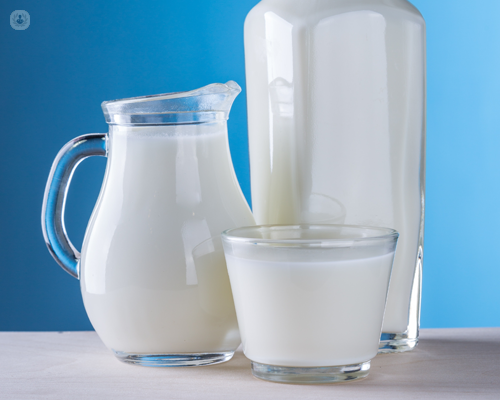Lactose intolerance
Dr Simon Gabe - Gastroenterology
Created on: 11-03-2015
Updated on: 04-26-2023
Edited by: Sophie Kennedy
What is lactose intolerance?
Lactose intolerance is a food intolerance that occurs after the ingestion of lactose. Lactose is a sugar that’s found in milk and milk products. If you are lactose intolerant, your body is unable to break down this sugar.

What causes lactose intolerance?
To digest lactose, the body needs an enzyme called lactase. Lactose intolerance occurs when the small intestine does not produce a sufficient amount of lactase to break down lactose. Instead, the lactose moves to the colon where it ferments with bacteria there.
What are the types of lactose intolerance?
There are different types of lactose intolerances, classified by the cause of the intolerance:
- Primary: as children began to add new foods to their diets, the lactase which was once produced in abundance to digest milk in infancy, starts to reduce. By adulthood, digestion of milk products can become very difficult.
- Secondary: develops after an illness, cancer treatment or surgery affecting the small intestine, which can hinder lactase production.
- Congenital: Rarely, babies are born unable to digest lactase. This is hereditary, but the baby must inherit the gene from both the mother and father for the intolerance to present.
- Development: affects infants who were born prematurely, before their digestion system has fully developed.
What are the symptoms of lactose intolerance?
Symptoms usually occur between 30 minutes and two hours after the ingestion of products with lactose. The most frequent symptoms include:
- abdominal pain
- nausea
- bloating and abdominal distension
- muscle spasms
- diarrhoea
- abdominal gas and flatulence
- floating stools
- redness of the perianal area
- vomiting
Other possible symptoms include:
- tiredness
- skin problems
- painful limbs
- nervousness
- inability to concentrate
- sleeping problems
Can you suddenly be lactose intolerant?
Lactose intolerance commonly appears during an adult's life, rather than someone being born with it or developing it during childhood. First cases will usually arise in those aged between twenty and forty.

How do I tell if I am lactose intolerant?
The symptoms of lactose intolerance can be mistaken for the symptoms of other conditions such as irritable bowel syndrome or another food intolerance or allergy. To confirm you’re lactose intolerant, before cutting out dairy from your diet, it is advisable to get a medical diagnosis first.
How is lactose intolerance diagnosed?
To diagnose this intolerance, three medical tests can be performed;
- a lactose tolerance test: after fasting for eight hours, you will be asked to consume a liquid containing a lot of lactose and your blood level will be checked. If your blood sugar levels don’t increase, it may mean your body is unable to break down lactose.
- lactose-hydrogen breath test: similar to the previous test, but instead of checking the blood, the levels of hydrogen in the breath are measured. High levels may indicate you are lactose intolerant.
- a faecal pH test: testing for acid in the stool of someone who is unable to break down lactic acid is mostly used to test children and infants.
Can lactose intolerance be prevented?
There is no way to prevent lactose intolerance, however, one can avoid consuming products with lactose or consume products that are lactose-free, such as lactose-free milk and cheese.
What is the treatment?
The only treatment for lactose intolerance is to reduce or avoid its intake. You can also take lactase enzyme supplements to help your body to break down lactose. You can’t help your body make more lactase.
What happens if you're lactose intolerant and you keep eating dairy?
Most people can still consume lactose if they are intolerant. Test out different dairy products, particularly those with naturally low levels of lactose, as some will cause fewer symptoms. Alternatively, look for lactose-free products.
How do you get calcium if you are lactose intolerant?
Some people can still tolerate small amounts of lactose, however, if it is recommended to cut out lactose completely, the nutrients found in milk like calcium and vitamin D can be substituted with:
- almonds
- tofu
- beans
- kale
- soy milk
- egg yolks
- fatty fish like salmon








